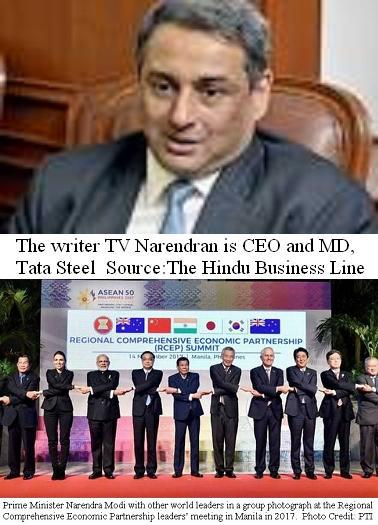|
||||||||
|
|
|
2019-12-10 ArtNo.46630
◆RCEP countries must pay heed to India's concerns
 【Mumbai】India's withdrawal from the the Regional Comprehensive Economic Partnership agreement (RCEP) was not entirely unexpected, given that key stakeholders had not been in favour of it. India's doubts on issues like exports and its economic relations with China are genuine and crucial for growth. Only when these are resolved, should India consider joining the agreement again. India put forward genuine reasons for its decision to withdraw, for the time being, from the negotiations undertaken by 16 countries of the RCEP grouping, which make eminent sense from the economic perspective. The decision brings relief to industry as well as farmers, who were rightly apprehensive about the wide-ranging impact it was likely to have on their livelihood. The decision brings relief to industry as well as farmers, who were rightly apprehensive about the wide-ranging impact it was likely to have on their livelihood. Following the adverse experience with the Japan and Korea FTAs, the goods segment was concerned with possible impact of the RCEP, since it would effectively mean a FTA with China. For most of the merchandise trade, China accounts for a significant share of the global capacity — in sectors like steel its nearly 50 per cent. Given that the other 15 countries already have very low or zero tariffs for goods traded amongst themselves under the alphabet soup of FTAs in place, India is the only country which would have been bound to cut its tariffs for the other members under the RCEP. However, with its service interests not adequately factored into the discussions over the years, the benefits to India from the RCEP were questionable. Reciprocity is also crucial. For example, in the steel sector, imports from Japan and Korea after signing the FTAs doubled while exports to these countries continued to remain negligible. It is indeed unfortunate that China could not provide India with a way out of its apprehensions relating to Chinese goods swamping Indian markets, either bilaterally or through the RCEP. This situation extends to the services sector as well. India's competitiveness vis-à-vis China is unlikely to benefit from economic reforms that India may undertake in the future. To assuage India's concerns, China must bilaterally work with us and resolve our market access issues in areas across pharmaceuticals, agriculture and manufactured goods. Only when we see a real improvement in our exports to China will the Indian industry become confident about lower tariffs for Chinese products and can accede to regional arrangements like the RCEP. 【News source】 RCEP countries must pay heed to India’s concerns ○One world:The aim of SEAnews Your Comments / UnsubscribeTweet to @TwitterDev SEAnews MessengerSEAnewsFacebookSEAnews eBookstoreSEAnews world circulation |
|
[Your Comments / Unsubscribe]/[您的意见/退订]/[ご意見/配信停止]
Please do not directly reply to the e-mail address which is used for delivering the newsletter. 请别用递送新闻的邮件地址而直接回信。 メールをお届けした送信専用アドレスには返信しないで下さい。 |